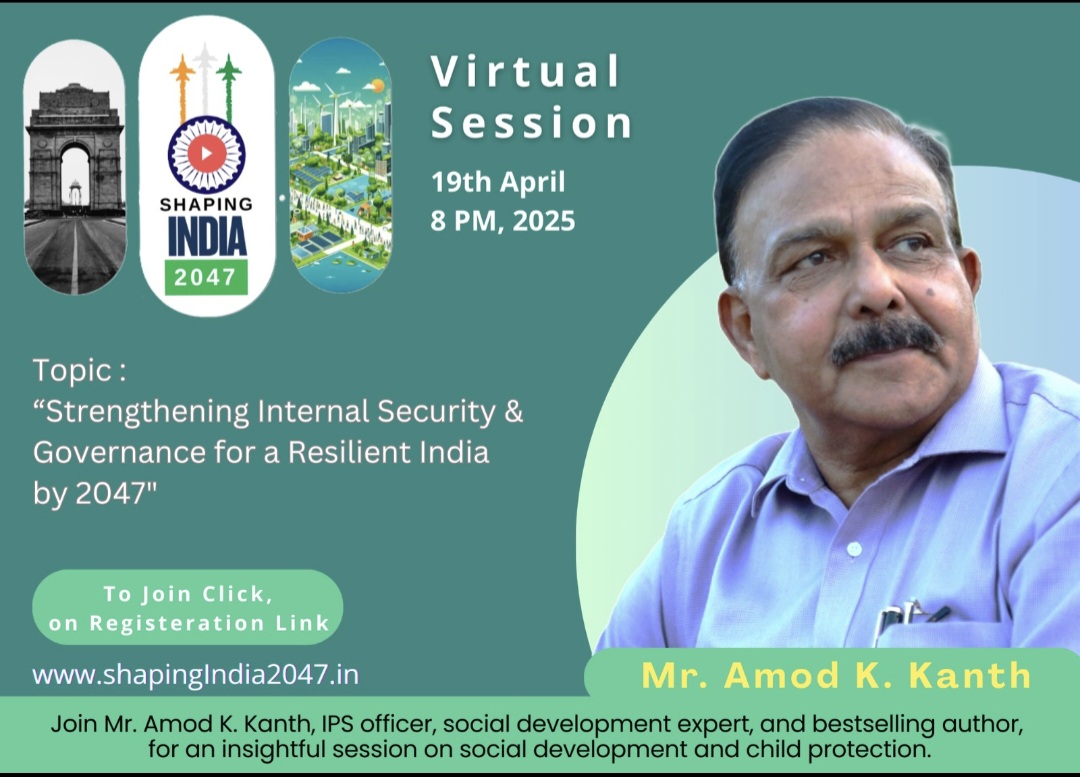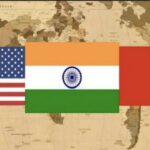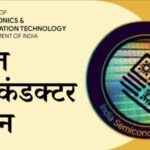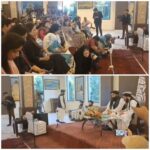
ShapingIndia2047 has organized one of schedule of online conference on Saturday 19th April 2025 with super cop and also a responsible acting social thinker Mr. Amod K Kanth. Topic of the online conference was “Strengthening Internal Security and Governance for a Resilient India by 2047.” Moderater of this online session was Dr. Paritosh Pathak and the session initiated by Mr. Avinash Anand. And officer of @PRABAH ngo & co-founder of ShaingIndia2047 Dr. Kumar Katyayani and Mr. Dheeraj Maurya and Founder of ShaingIndia2047 Arun Pradhan was also in the virtual session.
Avinash introduced a new initiative called “Shaping India 2047” aimed at discussing India’s vision for 2047. The initiative, which started two months ago, has invited various experts to share their perspectives on the topic. Mr. Amod Kanth, a social sector volunteer, was invited to discuss his views on the topic of ‘Strengthening Internal Security and Governance for a Resilient India by 2047’.
Sir Amod shared his experiences and insights from his 34 years in the police and 37 years in the social sector. He emphasized the interconnectedness of his work and life, viewing them as indivisible. He expressed his gratitude for the invitation and agreed to share his views on the subject.


India’s Progress and Challenges-
Sir Amod discusses India’s progress since independence in 1947, highlighting significant improvements in life expectancy and per capita income. He contrasts India’s economic position before British rule with its state at independence, emphasizing the country’s remarkable recovery and development. He notes the challenges India faces, including the need for improvements in the criminal justice system and sustainable development goals. He credits India’s resilient democracy, constitution, and civil services for the country’s success, while acknowledging that further progress is needed to achieve developed country status by 2047.

India’s Internal Security and Extremism –
Sir Amod discussed the internal security setup in India, highlighting the vast and complex system involving 2.5 million policemen, state police forces, and central government forces. He emphasized the importance of protection for citizens, both internally and externally, and the role of the police in maintaining order. He also touched on the relationship between extremism and underdevelopment, using the example of left-wing extremism in certain districts of India. He mentioned the challenges faced in areas like Kashmir and the northeast, and the need for understanding the historical reasons behind these issues.

India’s Internal Security Challenges Discussed –
Sir Amod discussed India’s internal security challenges, including the impact of social media on creating security challenges and the rise of cyber crimes. He highlighted the importance of understanding the historical background of issues like Jammu and Kashmir and the role of social media in spreading riots. He also emphasized the need to tackle cyber crimes and money laundering and the challenges posed by India’s borders with neighboring countries. He mentioned the role of various agencies in India’s security apparatus, including the Cabinet Committee on Security, National Security Council, and intelligence agencies like IB and RAW.

Community Participation in Governance and Policing –
Sir Amod discusses the importance of community participation in governance and policing for a resilient India. He emphasizes the need for changes in the legal system and better implementation of existing laws. He highlights the disconnect between India’s economic growth and its socioeconomic challenges, stressing the importance of harmonizing development with security considerations. He also addresses the need for a comprehensive national security doctrine, improved cyber security, and better community engagement in law enforcement.

Balanced Policing and Legal Awareness –
The discussion covers various aspects of policing, social issues, and legal awareness. He emphasizes the importance of conventional and violent crime prevention, as well as addressing sensitive areas like extremism and insurgency. The participants discuss the challenges of communal disputes, particularly in West Bengal, and the need for balanced law enforcement that respects individual rights while maintaining social order. They also highlight the importance of increasing legal awareness among citizens and suggest using technology and social media platforms to disseminate information about law and administration.”
Mr. Amod K Kanth is Known for IPS officer, Rajiv Gandhi assassination investigation, transistor bomb blast cases, anti-Khalistani terrorism, Charles Sobhraj case, Jessica Lal murder case, Lalit Maken murder case, General A S Vaidya murder case, BMW hit-&-run case, 1984 Delhi anti-Sikh riots, Harshad Mehta case, Jain Hawalah case, Prayas, DCPCR, Domestic Workers Sector Skill Council.








